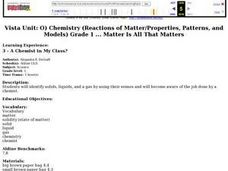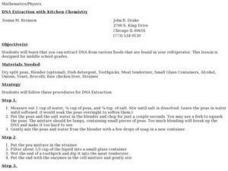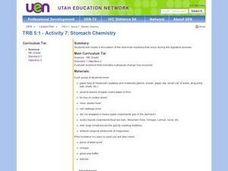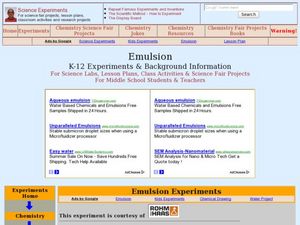Curated OER
Soap Bubble Chemistry
Students investigate soap bubbles. In this soap bubble chemistry lesson, students observe a demonstration using pop-it beads to represent a soap molecule. Students produce soap bubbles in the lab by making bubbles with a large bubble...
Virginia Department of Education
Soap, Slime, and Creative Chromatography
Do you think chromatography paper suffers from separation anxiety? Young chemists make soap, slime, silly putty, and experiment with chromatography in this lesson. The material includes clear instructions for each experiment along with...
Curated OER
The Art of Soap Making
Here is a nice, clean wrap-up activity for your chemistry class when they are studying chemical reactions . They experiment with different oils to make soap. To make it more fun, they are to imagine that they are part of a soap testing...
Curated OER
Making Soap
Students explore what chemical indicators are and use pH paper to determine if something is alkaline or basic. In this pH lesson students manufacture their own soap.
Beyond Benign
In a Lather
Time to come clean! Scholars continue preparing the shampoo they created in the previous two lessons. The purpose of this stage is to calculate the perfect amount of additive to make the shampoo lather.
Curated OER
What is Soap?
Students investigate soap, how it is made and its structure. In this soap lesson, students observe a demonstration of soap being made. Students observe the properties of soap and how soap performs in "real-life" situations like cutting...
Virginia Department of Education
DNA Extraction from Strawberries
Has your class ever been astounded by the complexity of DNA analysis? Have they ever asked why genetic engineering has become so important to our daily lives? Young scientists perform DNA extraction on strawberries and explore how the...
Curated OER
Blow the Best Bubbles
Here is an exciting, and meaningful science lesson on the formation of bubbles! Young scientists have three cups with a variety of solutions in them. One cup has detergent only, one has glycerin added to it, and the third has corn syrup...
Curated OER
The Chemistry of Bigger Bubbles
Fourth graders explore properties of bubbles. In this instructional activity about bubbles, 4th graders perform an experiment. Students analyze the properties of bubble making substances and surface tension. Students create a square...
Curated OER
Fun With Chemical Changes
Looking for a terrific chemistry lesson for your 5th graders? This one could be for you! After a teacher-led demonstration, learners are broken up into groups and perform an experiment using cabbage juice, water, window cleaner, and...
Curated OER
A Chemist in My Class?
First graders in kindergarten science class discuss matter. They make predictions and then identify mystery items in brown paper bags as either solid, liquid, or gas by using their senses. They discuss that a chemist is a scientist that...
Curated OER
Testing Water for Hardness Using Soap Bubbles K-12 Experiments & Background Information
Students examine water and what causes it to become hard. In this water lesson students use the soap test and determine the mineral content and hardness of a sample of water.
Curated OER
Twirly Whirly Milk
Student observe the effect soap (or detergent) has on the movement of food color in milk. Pupils observe the properties of solids and liquids while making butter. They read a poem, Shaking, and listen for ryhming words. Studdents...
University of Georgia
What's So Special about Bottled Drinking Water?
Is artesian water designed to be better, or is it just from wells similar to those in the city of Artesium? This experiment looks at many different types of bottled waters, including artesian. Using a soap mixture, scholars test to see...
Curated OER
Candy Cane Chemistry
Fourth graders, in groups, examine the effect of heat on bonding forces by doing laboratory work.
Curated OER
DNA Extraction with Kitchen Chemistry
Students extract DNA from green peas. In this DNA extraction lesson plan, students use a blender to chop up peas, they mix them with a little soap, they tenderize them and they mix them with alcohol to see the DNA precipitate through the...
Curated OER
Molecular Forces at Work: Creating Soap Bubbles
Learners investigate adhesion, cohesion and surface tension. In this molecular forces lesson plan, students observe multiple demonstrations that show surface tension, the attraction of water molecules to each other and the ability of...
Curated OER
Crazy Chemistry Lesson Plan
Students study water molecules, cohesion and surface tension. In this molecule cohesion lesson students create chemical reactions that cause a balloon to inflate and another one that results in soap suds.
Curated OER
Stomach Chemistry
Fifth graders compare physical and chemical changes. They perform a simulation experiment/activity that replicates what happens in the stomach as food is digested by stomach acids.
Cornell University
Nano Interactions
Tiny particles can provide big learning opportunities! Middle school scientists explore the world of nanoparticles through reading, discussion, and experiment. Collaborative groups first apply nanotechnology to determine water...
Beyond Benign
Breaking the Tension
The tension builds as learners experiment in your classroom. The 17th installment in a 24-part series has scholars investigate the concept of surface tension. After discovering characteristics of surface tension, they add a compound...
Curated OER
Emulsions
Students identify the characteristics and composition of emulsions. In this chemistry lesson, students classify household products according to emulsion type. They explain how to make the best emulsion.
Curated OER
Water
Students conduct a series of investigations on the unique properties of water. In this general science lesson, students explain what causes water's surface tension. They explain the different stages in the water cycle.
Curated OER
Making soap you can use
Those textbook experiments are no good. Using this simple method you can make a real bar of soap. It's

























